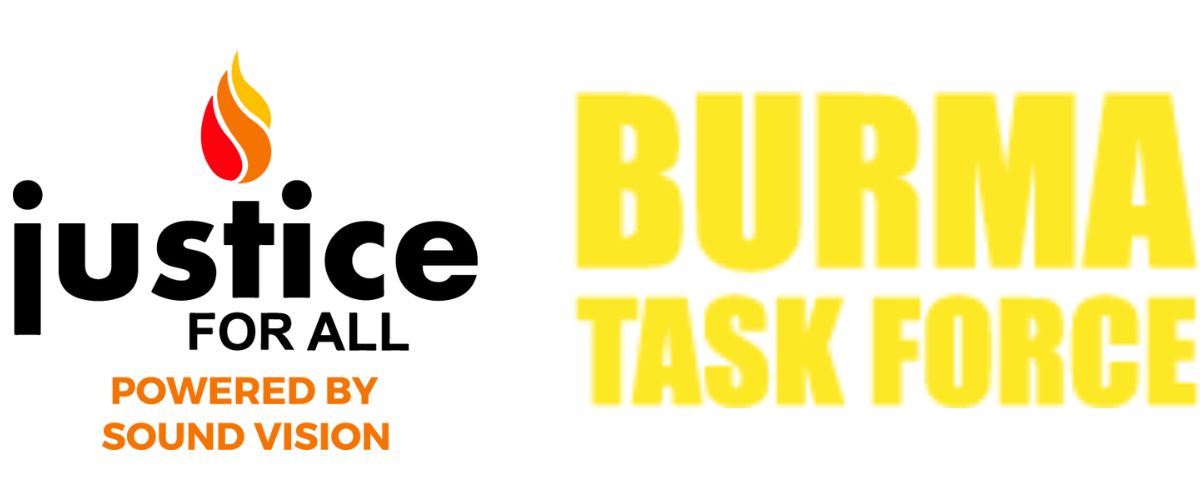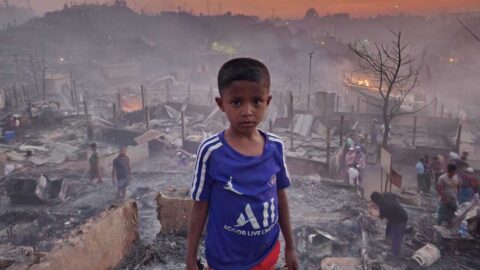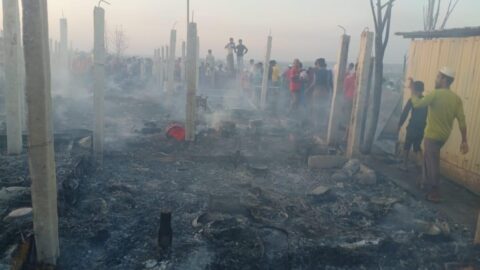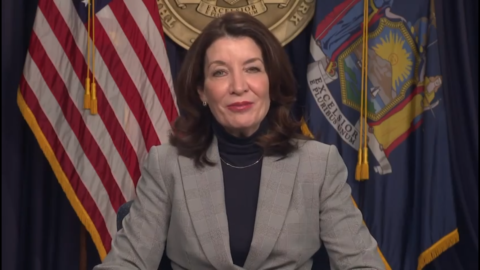According to Burma Task Force Staff on the ground, a massive fire swept through parts…
Islamophobia in Nashville Newspaper
Discrimination and irrational fear of Muslims and Islam is still on the rise across the nation. According to a report published by the Institute for Social Policy and Understanding, negative public opinion has increased over the last two years. Nationally, Muslims only account for 1% of the population yet Islam is also the fastest growing religion in the United States. Recently, an article published in ‘The Tennessean’, a local newspaper in Nashville, Tennessee, suggested that Muslims are prepared to use nuclear weapons against the United States, potentially inciting more hatred and fear towards the Muslim-American population. The Tennessean, run by editor Maria De Verenne, is the principal daily newspaper in Nashville, Tennessee. Its circulation area covers 39 counties in Middle Tennessee and eight counties in southern Kentucky.
Guest:
Sabin Mohyuddin is a Bangladeshi American Muslim born and raised in Nashville, Tennessee. She graduated from Vanderbilt University in 1993 with a degree in Mechanical Engineering. In 2010, Sabina helped launch the Sons and Daughters of Abraham Project which brings Muslim, Christian, and Jewish youth across Middle Tennessee together through interfaith dialogue and outreach programs. She is a founding board member and currently the Executive Director of the American Muslim Advisory Council, which empowers the Muslim community in Tennessee through civic engagement, community building and improved media relations.
Questions and answers
What does it mean to be a thriving community in the middle of the Bible Belt?
“The American Muslim Advisory Council is a very statewide organization. The larger cities are usually more progressive. So what you see in rural Tennessee is different from what you’ll see in Nashville. But those who try to marginalize our community and do the fear mongering can be anywhere.”
When the ad came out, was it something you expected to see?
“It was a feeling of shock… It was very specific to Nashville, I was shocked to see it in the Tennessean.”
The City has had its first African American Muslimah Councilwoman so that’s progress on that front, but that also scares people because it represents change.
Zulfat Suara became a councilwoman at large, so she represents all of Nashville and has done a lot of work for all marginalized communities. Her expertise in finance has helped her through the very difficult budget process. People know her, but it is to be expected that the more progress you make, the more people will shout louder.
Should small cities who are facing anti-Muslim bigotry use the same tactics as those are in larger cities with bigger Muslim populations?
No, you have to know your people and know who your enemies are. You have to know who are the ones that are being misled, and work with your allies.
How do you think this kind of rhetoric could impact things like Trump’s campaign or other politics?
“With or without the article, it is an election year and stats show that Islamophobic attacks rise during election years. Even before the ad, I was warning community members ‘look, this is an election year so be on the lookout. It may just be an ad, but politicians are going to take what they need.”
You are at the nexus of where organizations like Act for America, the largest anti-Muslim grassroots organizatios in the country, are based. What has the community in Nashville planned for educating people and getting more people involved and involve the Muslim community in civic engagement?
We need to be out in the community, we need to know what the issues are, especially with the local elections, and we need to be voting. Even if you can’t vote, being civically engaged and educating the community on these issues is important. Trying to understand racism in terms of educating them on things like economic inequality.
What has transpired since the incident?
They are giving us $25,000 in free ad space for Muslim organizations and businesses to use. We want to use this strategically and wisely, to benefit not just the Muslim community, but the broader community. Empowering our community means we build alliances and we are not only fighting for our rights, we are fighting for everyone’s rights.
Quotes and Hashtags:
What you see in rural Tennessee is different from the bigger cities, but there can be discrimination from anywhere. #EndBigotry
Unfortunately, the youth are some of the first to feel the discrimination. #EducateYourYouth
After an incident in 2010, the Muslim community approached the editors of the Tennessean newspaper and began to build a rapport with them. They discouraged reactionary reporting and encouraged community engagement and consideration of impact. #EducateOurCommunity #EducateOurMedia
This relationship made the printing of the advertisement even more shocking.
The Editorial department was separate from the marketing and advertising department. Regardless, the final product is on their shoulders and they took responsibility for it.
Even though the ad was taken off of the online version, the print paper still had the advertisement and the damage could not be undone. The problem is that this ad could be confirming people’s prejudices about Muslims. #KnowYourImpact
The same group had printed an ad a few days earlier, it was written differently, but it was a buildup to Sunday’s ad. It didn’t mention Muslims or Islam directly, but it should have been a warning sign to look out for that group.
In 2010 there was a lot of controversy regarding the building of a mosque and they went through hell in terms of pushback, discrimination, and bullying aimed at youth. In 2011 There was an anti Sharia bill from the Tennessee state legislature. We came together as a community to fight the misinformation.
It was in the wake of these campaigns against the Muslim community that we realized the Mosques were not equipped to fight Islamophobia. That’s how we started the American Muslim Advisory Council. #PrepareToEducate
If an outside organization comes in and tries to take the lead, they have no credibility in the community and that sometimes causes a larger backlash. #KnowYourCommunity
Sometimes we publicly call out injustices, and sometimes it is necessary to privately contact people or groups.
The 2018 gubernatorial race saw one of the candidates disparage his opponent because they went to a Muslim owned restaurant and he was publicly called out on it. #EducateYourself
But an instance of privately organizing was when there was a security summit. Publicly calling it out may have caused more backlash and islamophobic support. In this case they got their allies to reach out and put pressure on the president of the University. #KnowYourEnemy
National and international pressure can hurt in terms of putting pressure on the government. Conservative governments like Tennessee and conservative groups may see national pressure as a sign of victory or a badge of courage, which can give them more publicity and money.
National or international pressure could help, but they have to work with the people on the ground. When the organization leaves, the people living there are the ones that are going to have to face the aftermath.
The newspaper has publicly apologized, there was a sales manager that was fired, but we want more information. We need to know how the protocol is changing and what practical diversity training is happening.
Diversity in staff is important, especially in media and production, because it provides much needed insight into events and communities.
Simply shutting down a widely read paper does nothing for the community and can hurt in terms of not allowing marginalized communities the opportunity to get their message out and educate people. #EducateDontEradicate
The eradication of independent newspapers is not good for democracy.
The thing to lookout for is the local politicians taking this rhetoric especially.
We need to educate the community on our rights in terms of interactions with law enforcement and in the workplace.
We also need to educate the non-Muslim Community on who we are, and what Islamophobia is in terms of scale and impact. We have to control the narrative #CulturalCompetencyIsKey



